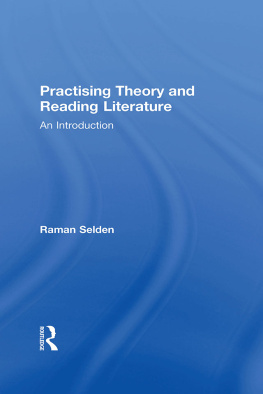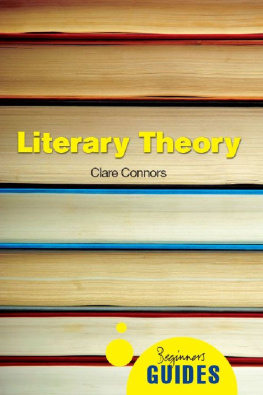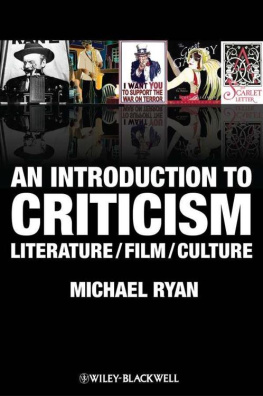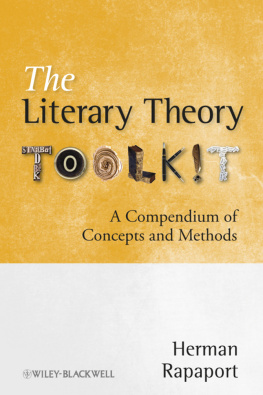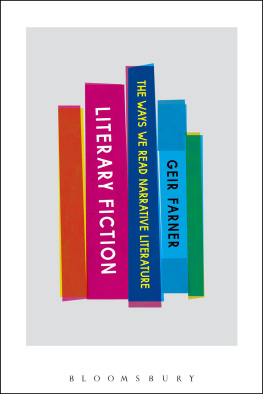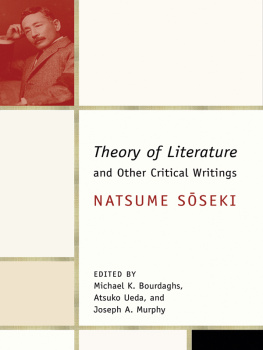Practising Theory and Reading Literature
By the same author
English Verse Satire, 1590-1 765, Allen & Unwin (1978)
Criticism and Objectivity, Allen & Unwin (1984)
The Poems of John Oldha m , co-editor with Harold Brooks, Clarendon Press (1987)
Masterguide: John Dryden, Absalom and Achitophel, Penguin (1986)
The Theory of Criticism from Plato to the Present, Longman (1988)
A Reader's Guide to Contemporary Literary Theory, Harvester Press (1985; 2nd edn, 1989)
Practising Theory and Reading Literature
An Introduction
Raman Selden
Professor of English Literature University of Lancaster
First published 1989 by Prentice Hall Europe
Published 2014 by Routledge
2 Park Square, Milton Park, Abingdon, Oxon OX14 4RN
711 Third Avenue, New York, NY 10017, USA
Routledge is an imprint of the Taylor & Francis Group, an informa business
Raman Seldon 1989
All rights reserved. No part of this book may be reprinted or reproduced or utilised in any form or by any electronic, mechanical, or other means, now known or hereafter invented, including photocopying and recording, or in any information storage or retrieval system, without permission in writing from the publishers.
Notices
Knowledge and best practice in this field are constantly changing. As new research and experience broaden our understanding, changes in research methods, professional practices, or medical treatment may become necessary.
Practitioners and researchers must always rely on their own experience and knowledge in evaluating and using any information, methods, compounds, or experiments described herein. In using such information or methods they should be mindful of their own safety and the safety of others, including parties for whom they have a professional responsibility.
To the fullest extent of the law, neither the Publisher nor the authors, contributors, or editors, assume any liability for any injury and/or damage to persons or property as a matter of products liability, negligence or otherwise, or from any use or operation of any methods, products, instructions, or ideas contained in the material herein.
ISBN 13: 978-0-7108-1158-5 (pbk)
British Library Cataloguing in Publication Data
Seldon, Raman.
Practising theory and reading literature
1. Literature, Criticisml. Title
8010.'95
Contents
| John Bunyan |
| John Keats |
| Henry James |
| Laurence Sterne |
| Craig Raine, William Golding |
| Christopher Smart |
| Arthur Miller |
| John Updike |
| Eugene O'Neill, Charles Dickens |
| Nathaniel Hawthorne |
| William Shakespeare |
| William Wordsworth, Emily Dickinson |
| William Shakespeare |
| William Wordsworth |
| Wallace Stevens |
| Edgar Allan Poe |
| Harold Pinter |
| Arnold Wesker, Samuel Beckett |
| John Milton |
| Kingsley Amis |
| Anne Bradstreet, Fleur Adcock |
| Daniel Defoe |
| James Joyce |
| William Shakespeare |
I am grateful to Harvester Wheatsheaf for suggesting and encouraging this book. I am much indebted to those colleagues at Lancaster University whose collaboration in the teaching of the theory and practice of criticism has kept me on my toes. I would like to thank especially Alison Easton, Michael Wheeler, David Carroll, Tony Sharpe, Robin Jarvis and Keith Hanley who have made helpful comments on individual chapters of the book. A particularly warm thank-you is due to Richard Dutton and Peter Widdowson who made penetrating observations on the entire manuscript.
Grateful acknowledgement is made to the following for permission to quote material in copyright:
Adcock, Fleur, 'The Ex-Queen among the Astronomers' from Selected Poems (1983). Reprinted by permission of Oxford University Press.
Heller, Joseph, an extract from Catch 22 (1955). Reprinted by permission of Joseph Heller and Jonathan Cape and Candida Donadio & Associates, copyright 1955, 1961 by Joseph Heller.
Lawrence, D. H,, an extract from 'The White Stocking', The Collected Short Stories, vol. I. Copyright 1933 by the Estate of D. H. Lawrence. Copyright renewed 1961 by Angelo Ravagii and C. M. Weekley, Executors of the Estate of Frieda Lawrence Ravagii. All rights reserved. Reprinted by permission of Viking Penguin, Inc.
Lessing, Doris, an extract from Memoirs of a Survivor (1974). Copyright 1974 by The Octagon Press; reprinted by permission of Alfred A. Knopf, Inc.
Mailer, Norman, an extract from An American Dream (1965). Reprinted by permission of Andr Deutsch Ltd and The Scott Meredith Literary Agency.
Orton, Joe, an extract from Loot (1967). Used by permission of Methuen London and Grove Press, a division of Wheatland Corporation.
Pinter, Harold, an extract from The Homecoming (1965). Used by permission of Methuen London and Grove Press, a division of Wheatland Corporation.
Raine, Craig, 'A Martian Sends a Postcard Home' from A Martian Sends a Postcard Home (1979). Reprinted by permission of Oxford University Press.
Rich, Adrienne, 'Planetarium'. All efforts have been made to trace the copyright holder. Grateful acknowledgement is made.
Smart, Christopher, an extract from Jubilate Agno in The Poetical Works of Christopher Smart (1980), vol. I (edited by Karina Williamson). Reprinted by permission of Oxford University Press.
Stevens, Wallace, 'A High-Toned Old Christian Woman', from The Collected Poems of Wallace Stevens. Reprinted by permission of Faber and Faber Ltd. Copyright 1923 and renewed 1951 by Wallace Stevens. Reprinted from The Collected Poems of Wallace Stevens, by permission of Alfred A. Knopf, Inc.
Williams, Tennessee, an extract from The Glass Menagerie. Copyright 1945 by Tennessee Williams and Edwina D. Williams and renewed 1973 by permission of Random House, Inc.
New for Old?
In David Lodge's Small World (1984) Philip Swallow, an old-fashioned academic, gives a paper at an international conference which neatly sums up what might be called the 'Old Criticism':
Philip Swallow was the first to speak. He said the function of criticism was to assist in the function of literature itself, which Dr Johnson had famously defined as enabling us better to enjoy life, or better to endure it. The great writers were men and women of exceptional wisdom, insight, and understanding. Their novels, plays and poems were inexhaustible reservoirs of values, ideas, images, which, when properly understood and appreciated, allowed us to live more fully, more finely, more intensely. But literary conventions changed, history changed, language changed, and these treasures too easily became locked away in libraries, covered with dust, neglected and forgotten. It was the job of the critic to... bring out the treasures into the light of day. Of course, he needed certain specialist skills to do this: a knowledge of history, a knowledge of philology, of generic convention and textual editing. But above all he needed enthusiasm, the love of books. It was by the demonstration of this enthusiasm in action that the critic forged a bridge between the great writers and the general reader. ( Small World, Penguin, Harmondsworth, 1985, p. 317)

